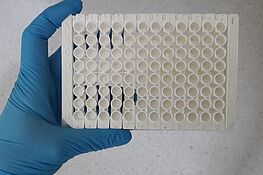For the quantitative determination of stress-associated biomarkers predominantly biochemical analytical methods are used. Stress-associated biomarkers can be measured in the following biological sample specimens:
The following well-established biomarkers in stress research are of main interest: markers of the autonomic nervous system, endocrine markers, and immunological markers.
Autonomic nervous system:
- catecholamines (blood)
- alpha-amylase (saliva)
Endocrine system:
hormones, for example,
- cortisol (saliva, blood or hair)
- adrenocorticotropic hormone (blood)
- testosterone (saliva)
- dehydroepiandrosterone, DHEA (saliva)
immune system:
- cytokines (blood and saliva)
- immunoglobulins (blood and saliva)
- lymphocyte-subpopulations (blood)
The following analytical methods are used in the BCL:
- immunoassays
Immunoassays are a method for quantifying concentrations of analytes using an antigen-antibody-reaction. At the BCL, the following immunoassays are used:
- enzyme-linked immunosorbent assays (ELISA)
- luminescence immunoassay (LIA)
- enzymatic-photometric test
This test is used to quantify the activity of enzymes such as alpha-amylase.

